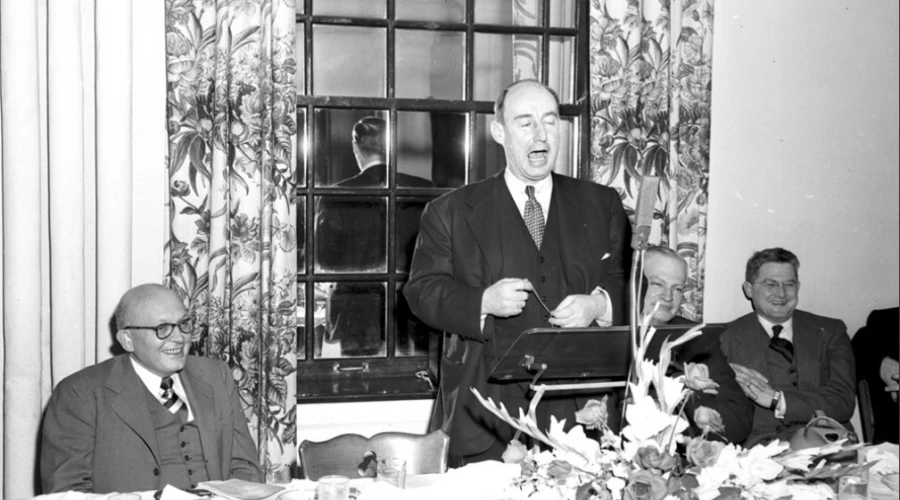Family
His father's side of the family included prominent Democrats and his mother's side were Republicans.
Adlai's grandfather, Adlai E. Stevenson I, was elected to the U.S. House of Representatives in 1874 and 1878. During Grover Cleveland's first presidential term, Adlai I served as Assistant Postmaster General. This was an important position because it controlled a large number of federal jobs.
He was then vice president during Cleveland's second term as president. In 1900, Adlai I was again a vice presidential nominee, this time on a losing ticket. In 1908, he ran unsuccessfully for Illinois governor. Adlai I's son Lewis (father of Adlai II) managed the extensive farmlands the family controlled around central Illinois. He was appointed Illinois Secretary of State in 1914.
Jesse Fell was Bloomington's first lawyer and newspaper publisher. He met Abraham Lincoln in the winter of 1834-35, and was active in creating the new Republican Party. Fell also helped convince Lincoln to run for the presidency in 1860. Stevenson's mother, Helen Davis Stevenson, was a daughter of Jesse Fell's daughter Eliza and Bloomington Pantagraph publisher W.O. Davis.
His paternal grandfather, Adlai E. Stevenson I (the name Adlai skipped a generation), was a U.S. vice president. A maternal great-grandfather, Jesse Fell, was one of the founders of the Illinois Republican Party. As Adlai would later confess, "I have a bad case of hereditary politics."
My hometown has taught me that good government and good citizenship are one and the same, that good individuals make a good town. And that nothing else does. I learned that good communities make a good state, and nothing else can. Here from my parents and grandparents, ...and many of you, I learned that good government is good politics, and that public office doubled the responsibility that a man felt for his own home, his own neighborhood, his home town.
Early Career
Adlai graduated from Princeton and earned a law degree from Northwestern. During World War II, he worked for the U.S. Navy and State Department. He also played a leading role in the establishment of the United Nations. In 1948, Adlai was elected governor of Illinois. As governor, he helped cleanup government by reducing politics in state hiring practices. He also opposed the anti-communist hysteria of "McCarthyism."
In 1952, he was the Democratic Party's nominee for president. He ran against the popular war hero General Dwight D. Eisenhower. The campaign ended in defeat but it made Stevenson a national figure. The two men faced each other again in 1956. Stevenson ran on a platform that asked for nuclear test bans and ending the military draft.
In the 1950s, the U.S. led the world in the development of nuclear weapons. It also maintained a clear lead in technology and the ability to deliver these weapons to their targets. In spite of this, both Democrats and Republicans used fear of nuclear attack by the Russians to win over voters. Nuclear tests were conducted in the atmosphere and radioactive materials were being spread worldwide. In his second presidential campaign, Adlai raised concerns that "...ways must be found to halt these explosions that poison our bodies, damage the position of America in the world and threaten our very existence." On April 21, 1956, he bravely called for an international nuclear test ban. He believed such a ban would demonstrate to the world the peaceful intentions of the U.S.
He lost again.
U.N. Ambassador
With the election of John F. Kennedy in 1960, Adlai was appointed ambassador to the United Nations. He became Ambassador in 1961, a time when the UN was the forum for the struggles between communism and capitalism.
These conflicting systems sought to win over the peoples of Africa, Asia and Latin America, often through violence. Conflicts raged in Congo, Cuba and Vietnam. Stevenson ultimately became less a decision-maker and more a spokesman. He was successful in bringing reason to the 1963 Cuban missile crisis. He convinced the American government to talk and deal with the Soviet Union when both governments were ready to hurl the world into a nuclear holocaust.
He was the most prominent world figure to have ever served as a UN Ambassador.
Adlai E. Stevenson II died on July 14, 1965, in London, England. He is buried in Evergreen Memorial Cemetery in Bloomington.
